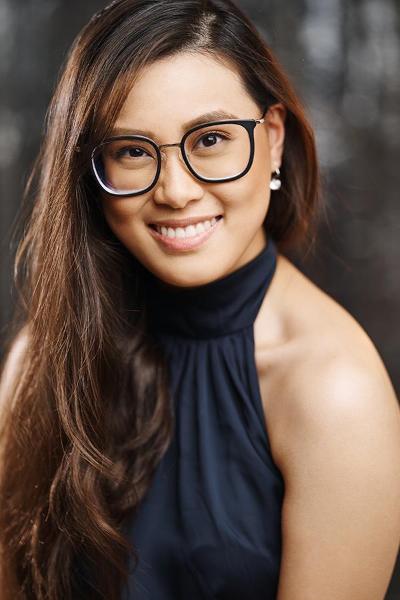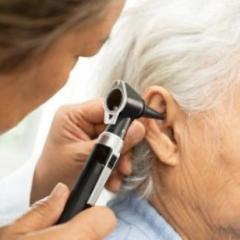 Speech Pathology HDR Student Genevieve Vuong was awarded the People’s Choice Award at this year’s School of Health and Rehabilitation Sciences 3MT competition, only to win the top prize at the Faculty of Health and Behavioural Sciences final, for her presentation: “TeleCHAT with Aphasia”.
Speech Pathology HDR Student Genevieve Vuong was awarded the People’s Choice Award at this year’s School of Health and Rehabilitation Sciences 3MT competition, only to win the top prize at the Faculty of Health and Behavioural Sciences final, for her presentation: “TeleCHAT with Aphasia”.
We caught up with Genevieve following her win at the Faculty level and asked her a few questions about her experience in 3MT, her research, and what the future holds.
Tell us about your PhD research
My PhD research focuses on evaluating the delivery of a comprehensive, high-dose aphasia therapy (CHAT) program via telerehabilitation (TeleCHAT). Aphasia is a communication disorder that is most commonly caused by a stroke. Aphasia impairs an individual’s ability to speak, comprehend, read and write, and therefore can be a debilitating condition. Whilst the prevalence of people with aphasia is high (over 140, 000 Australians), access to services is limited, even more so for people with chronic aphasia. CHAT is an evidence based program that is currently being implemented as a health service, however its intensity restricts attendance for people with poor mobility, transport, fatigue, or people who live further away. Telerehabilitation is one way to improve the accessibility of CHAT, however its comprehensiveness provides challenges for its delivery. My PhD will be the first to translate CHAT into TeleCHAT and evaluate the feasibility, usability and acceptability of the program.
What made you want to conduct research into this area in particular?
Throughout my undergraduate degree in Speech Pathology, I had the opportunity to complete a Summer Research Scholars Program. This program allowed me to experience research within speech pathology, and I became involved in delivering a novel therapy program for people with aphasia. It led to my fondness for working with and supporting people with aphasia. In my final year of my bachelor’s degree, I completed an elective subject in telehealth, which piqued my interest as I realised it provided an equitable option for people to access healthcare. When a scholarship opportunity was released for a PhD combining the delivery of the program I did my Summer Research on, with telehealth, I couldn’t resist. I was excited to build pathways to expanding health services for people with aphasia, who so desperately need it.
Genevieve Vuong _ TeleCHAT with Aphasia from Genevieve Vuong on Vimeo.
What’s next for you and your research?
I am not set on a clear pathway post-PhD, however I have a keen interest in teaching and academia as I believe in advancing the education for the next generation of speech pathologists. I also would like to build on my clinical expertise and gain more experience working as a clinical speech pathologist.
Why did you decide to compete in the 3MT? What were you hoping to get out of it?
The 3MT is an innovative way for PhD candidates to succinctly convey their ideas but also generate deeper conversation to further knowledge and scientific progress. I decided to compete in the 3MT as it would give me an incredible platform to share my research with the general public and shine a spotlight on people with aphasia, as well as the life-changing benefits of telehealth.
The 3MT gave me the opportunity to practice my skills as a research communicator, disseminating research in a way that is easily understandable and accessible to all. It’s also been thought provoking and inspiring to learn about the exciting up and coming research developing across different fields of study.
I have most enjoyed preparing my presentation for the 3MT. It allowed me to re-evaluate my research and through the process of condensing my research into 3 minutes, I have gained a deeper understanding of my study. I was able to reaffirm the core reason of why I am doing this research: to create equitable ways of accessing high standards of healthcare.
Reading an 80,000 word thesis would take around 9 hours. 3MT competitors describe their research in 3 minutes! How did you go about doing that?
It was certainly not an easy task! I watched many TedTalks and past 3MT videos to learn what made their presentations so engaging. I also consulted past winners for advice on how to write such a concise version of their thesis. I think the greatest advice I received was to condense and not cut out information. A lot of effort was spent to make every single word of my speech count. Once I had written my speech, I practiced it in front of anyone who would listen: my partner, my friends and my family. They all gave me different perspectives and feedback on how they understood my research, which allowed me to modify my presentation to make it engaging for all. I then spent countless hours memorising, rehearsing and doing multiple takes of my 3MT, to get it to the final polished version. Whilst it was a challenging task, it really allowed me to re-evaluate my research and an enjoyable way to disseminate my passion project.
View all the Faculty of Health and Behavioural Sciences finalists’ 3MT videos here.



